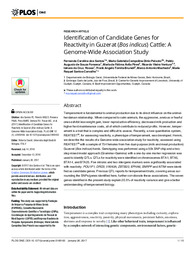Identification of candidate genes for reactivity in Guzerat (Bos indicus) cattle: a genome-wide association study.
Identification of candidate genes for reactivity in Guzerat (Bos indicus) cattle: a genome-wide association study.
Autoria: SANTOS, F. C. dos; PEIXOTO, M. G. C. D.; FONSECA, P. A. de S.; PIRES, M. de F. A.; VENTURA, R. V.; ROSSE, I. da C.; BRUNELI, F. A. T.; MACHADO, M. A.; CARVALHO, M. R. S.
Resumo: Temperament is fundamental to animal production due to its direct influence on the animal-herdsman relationship. When compared to calm animals, the aggressive, anxious or fearful ones exhibit less weight gain, lower reproductive efficiency, decreased milk production and higher herd maintenance costs, all of which contribute to reduced profits. However, temperament is a trait that is complex and difficult to assess. Recently, a new quantitative system, REATEST®, for assessing reactivity, a phenotype of temperament, was developed. Herein, we describe the results of a Genome-wide association study for reactivity, assessed using REATEST® with a sample of 754 females from five dual-purpose (milk and meat production) Guzerat (Bos indicus) herds. Genotyping was performed using a 50k SNP chip and a two-step mixed model approach (Grammar-Gamma) with a one-by-one marker regression was used to identify QTLs. QTLs for reactivity were identified on chromosomes BTA1, BTA5, BTA14, and BTA25. Five intronic and two intergenic markers were significantly associated with reactivity. POU1F1, DRD3, VWA3A, ZBTB20, EPHA6, SNRPF and NTN4 were identified as candidate genes. Previous QTL reports for temperament traits, covering areas surrounding the SNPs/genes identified here, further corroborate these associations. The seven genes identified in the present study explain 20.5% of reactivity variance and give a better understanding of temperament biology.
Ano de publicação: 2017
Tipo de publicação: Artigo de periódico
Unidade: Embrapa Gado de Leite
Palavras-chave: Cattle temperament, Temperament biology, Temperament traits in cows
Observações
1 - Por padrão são exibidas publicações dos últimos 20 anos. Para encontrar publicações mais antigas, configure o filtro ano de publicação, colocando o ano a partir do qual você deseja encontrar publicações. O filtro está na coluna da esquerda na busca acima.
2 - Para ler algumas publicações da Embrapa (apenas as que estão em formato ePub), é necessário ter, no celular ou computador, um desses softwares gratuitos. Sistemas Android: Google Play Livros; IOS: iBooks; Windows e Linux: software Calibre.
Acesse outras publicações
Acesse a Base de Dados da Pesquisa Agropecuária (BDPA) para consultar o acervo completo das bibliotecas da Embrapa.

